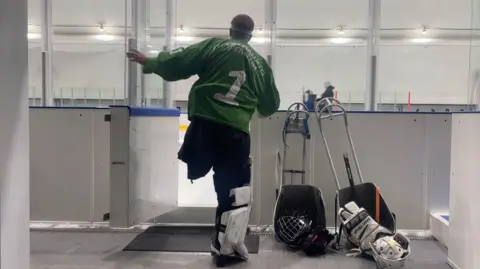At an ice rink in Vladivostok in Russia's far east, 30-year-old Dmitry Afanasyev is in training with teammates from Soyuz, the local Para ice hockey team.
The players have removed their prosthetic legs and are sitting in specially designed sleds. They're using their hockey sticks to propel themselves around the rink.
Dmitry hopes that one day he'll be a Paralympic ice hockey champion.
Making that happen won't be easy. Russian teams were banned from the last Paralympic Games over the war in Ukraine.
And like all his teammates, Dmitry was on the front line.
A mine came flying towards me, recalls Dmitry, who was mobilised to fight in Ukraine. I fell to the ground and could feel my leg burning. I looked down and everything was torn apart. I put on a tourniquet myself and told the guys to drag me out of there.
My wife's a surgeon. So, I sent her a picture of my leg and she replied: 'They'll probably saw it off.' 'OK,' I said. Whether I have one leg, or two legs. Whatever.
The port city of Vladivostok is more than 4,000 miles from Ukraine and from Russia's capital. This is Asia. The border with North Korea is 80 miles from Vladivostok. China is just 35 miles away.
Yet the consequences of a distant war in Europe are more than visible.
At a cemetery on a hill overlooking Vladivostok there are lines of fresh graves: Russian soldiers killed in Ukraine. In addition to Orthodox Christian crosses, military banners and Russian tricolours mark each plot.
On the orders of President Putin, Russian troops poured across the border with Ukraine in February 2022, initiating a war that continues to rage on. A local cemetery now stands as a poignant reminder of the cost of conflict.
In parks, cafes, and public spaces, opinions vary. Svetlana expresses a common desire for peace, while Ilya suggests life remains stable enough despite the circumstances.
Local musician Johnny London observes that discussions about Ukraine rarely surface among his peers, highlighting a disconnect between the war and daily life in Vladivostok.
A mural of Putin hugging a Siberian tiger, approved by local authorities, signifies an official narrative that intertwines nationalism and wildlife conservation — a curious juxtaposition illustrating the complexities of identity in modern Russia.



















